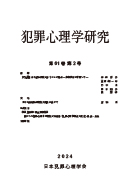
- Issue 2 Pages 1-
- Issue 1 Pages 1-
- |<
- <
- 1
- >
- >|
-
Saiko Shinto, Yuichiro Kanazawa, Izumi Kadomoto, Kanako Kuniyoshi, Hid ...2024 Volume 61 Issue 2 Pages 1-15
Published: January 31, 2024
Released on J-STAGE: February 23, 2024
JOURNAL FREE ACCESSA great deal of evidence posits that women exhibit distinct pathways to crime and treatment needs. Thus, this study examines the mechanism by which incarcerated women developed depression. The study analyzed comprehensive data on 647 incarcerated women who were discharged from major penal institutions throughout Japan. The results indicate that neither the path from victimization experiences in adulthood to self-esteem nor the path from self-esteem to depression was significant. However, experiences related to abuse from parents during childhood were correlated with low levels of self-esteem, which is, in turn, correlated with increased tendencies toward depression.
View full abstractDownload PDF (656K)
-
Wataru Zaitsu2024 Volume 61 Issue 2 Pages 17-29
Published: January 31, 2024
Released on J-STAGE: February 23, 2024
JOURNAL FREE ACCESSOnly a few criminal psychology studies have investigated animal abusers, and there is little evidence in Japan. Nevertheless, it is often stated that “animal abuse is a sign of future atrocious crimes such as homicide”. Many studies on this topic have been conducted internationally. The classical theories for mechanism of animal abuse are various: ‘social learning theory (Akers, 1985),’ ‘moral disengagement (Bandura, 1990),’ and ‘general strain theory (Agnew, 1992).’ Macdonald (1963) proposed the ‘Macdonald triad’ of risk factors in children, including animal abuse, enuresis, and fire setting that can escalate in the future to interpersonal violence and homicide. The ‘graduation hypothesis’ similar to Macdonald’s triad, assumes that the object of children’s aggression changes from animals to humans. However, after the 2000s, the graduation hypothesis has been replaced by the ‘deviance generalization hypothesis,’ postulating that children with a history of animal abuse are apt to conduct various criminal acts in the future. Furthermore, recent researches have supported ‘LINK’ that animal abuse is deeply related to child abuse and domestic violence. The author emphasized the critical need to conduct criminal psychology studies on animal abuse in Japan and discussed research methods.
View full abstractDownload PDF (433K)
- |<
- <
- 1
- >
- >|